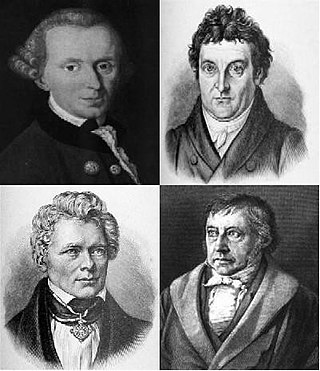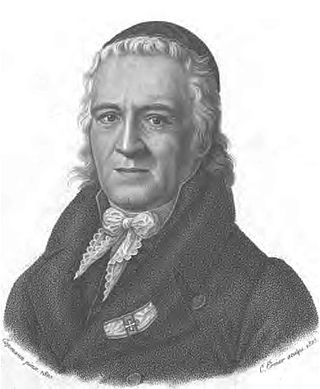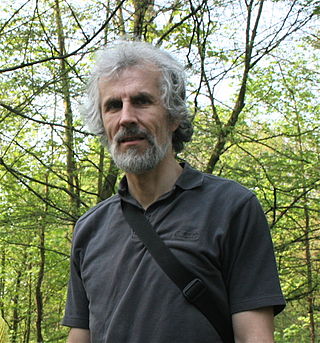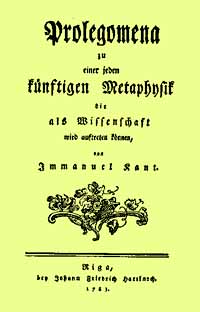Related Research Articles

Concepts are defined as abstract ideas. They are understood to be the fundamental building blocks underlying principles, thoughts and beliefs. They play an important role in all aspects of cognition. As such, concepts are studied by several disciplines, such as linguistics, psychology, and philosophy, and these disciplines are interested in the logical and psychological structure of concepts, and how they are put together to form thoughts and sentences. The study of concepts has served as an important flagship of an emerging interdisciplinary approach called cognitive science.

Immanuel Kant was a German philosopher and one of the central Enlightenment thinkers. Born in Königsberg, Kant's comprehensive and systematic works in epistemology, metaphysics, ethics, and aesthetics have made him one of the most influential figures in modern Western philosophy.

In philosophy, the term idealism identifies and describes metaphysical perspectives which assert that reality is indistinguishable and inseparable from perception and understanding; that reality is a mental construct closely connected to ideas. Idealist perspectives are in two categories: subjective idealism, which proposes that a material object exists only to the extent that a human being perceives the object; and objective idealism, which proposes the existence of an objective consciousness that exists prior to and independently of human consciousness, thus the existence of the object is independent of human perception.

A phenomenon , sometimes spelled phaenomenon, is an observable event. The term came into its modern philosophical usage through Immanuel Kant, who contrasted it with the noumenon, which cannot be directly observed. Kant was heavily influenced by Gottfried Wilhelm Leibniz in this part of his philosophy, in which phenomenon and noumenon serve as interrelated technical terms. Far predating this, the ancient Greek Pyrrhonist philosopher Sextus Empiricus also used phenomenon and noumenon as interrelated technical terms.
In philosophy, a noumenon is knowledge posited as an object that exists independently of human sense. The term noumenon is generally used in contrast with, or in relation to, the term phenomenon, which refers to any object of the senses. Immanuel Kant first developed the notion of the noumenon as part of his transcendental idealism, suggesting that while we know the noumenal world to exist because human sensibility is merely receptive, it is not itself sensible and must therefore remain otherwise unknowable to us. In Kantian philosophy, the noumenon is often associated with the unknowable "thing-in-itself". However, the nature of the relationship between the two is not made explicit in Kant's work, and remains a subject of debate among Kant scholars as a result.

German idealism was a philosophical movement that emerged in Germany in the late 18th and early 19th centuries. It developed out of the work of Immanuel Kant in the 1780s and 1790s, and was closely linked both with Romanticism and the revolutionary politics of the Enlightenment. The best-known thinkers in the movement, besides Kant, were Johann Gottlieb Fichte, Friedrich Wilhelm Joseph Schelling, Georg Wilhelm Friedrich Hegel, and the proponents of Jena Romanticism. August Ludwig Hülsen, Friedrich Heinrich Jacobi, Gottlob Ernst Schulze, Karl Leonhard Reinhold, Salomon Maimon and Friedrich Schleiermacher also made major contributions.

In philosophy, the brain in a vat (BIV) is a scenario used in a variety of thought experiments intended to draw out certain features of human conceptions of knowledge, reality, truth, mind, consciousness, and meaning. It is a modernized version of René Descartes's evil demon thought experiment, originated by Gilbert Harman. Found in many science fiction stories, it outlines a scenario in which a mad scientist, machine, or other entity might remove a person's brain from the body, suspend it in a vat of life-sustaining liquid, and connect its neurons by wires to a supercomputer that would provide it with electrical impulses identical to those a brain normally receives. According to such stories, the computer would then be simulating reality and the "disembodied" brain would continue to have perfectly normal conscious experiences, such as those of a person with an embodied brain, without these being related to objects or events in the real world.

Subjective idealism, or empirical idealism, is a form of philosophical monism that holds that only minds and mental contents exist. It entails and is generally identified or associated with immaterialism, the doctrine that material things do not exist. Subjective idealism rejects dualism, neutral monism, and materialism; indeed, it is the contrary of eliminative materialism, the doctrine that all or some classes of mental phenomena do not exist, but are sheer illusions.

The Critique of Pure Reason is a book by the German philosopher Immanuel Kant, in which the author seeks to determine the limits and scope of metaphysics. Also referred to as Kant's "First Critique", it was followed by his Critique of Practical Reason (1788) and Critique of Judgment (1790). In the preface to the first edition, Kant explains that by a "critique of pure reason" he means a critique "of the faculty of reason in general, in respect of all knowledge after which it may strive independently of all experience" and that he aims to reach a decision about "the possibility or impossibility of metaphysics." The term "critique" is understood to mean a systematic analysis in this context, rather than the colloquial sense of the term.

Transcendental idealism is a philosophical system founded by German philosopher Immanuel Kant in the 18th century. Kant's epistemological program is found throughout his Critique of Pure Reason (1781). By transcendental Kant means that his philosophical approach to knowledge transcends mere consideration of sensory evidence and requires an understanding of the mind's innate modes of processing that sensory evidence.

Karl Leonhard Reinhold was an Austrian philosopher who helped to popularise the work of Immanuel Kant in the late 18th century. His "elementary philosophy" (Elementarphilosophie) also influenced German idealism, notably Johann Gottlieb Fichte, as a critical system grounded in a fundamental first principle.

The World as Will and Representation, sometimes translated as The World as Will and Idea, is the central work of the German philosopher Arthur Schopenhauer. The first edition was published in late 1818, with the date 1819 on the title-page. A second, two-volume edition appeared in 1844: volume one was an edited version of the 1818 edition, while volume two consisted of commentary on the ideas expounded in volume one. A third expanded edition was published in 1859, the year prior to Schopenhauer's death. In 1948, an abridged version was edited by Thomas Mann.

Francis Paul Heylighen is a Belgian cyberneticist investigating the emergence and evolution of intelligent organization. He presently works as a research professor at the Vrije Universiteit Brussel, where he directs the transdisciplinary research group on "Evolution, Complexity and Cognition" and the Global Brain Institute. He is best known for his work on the Principia Cybernetica Project, his model of the Internet as a global brain, and his contributions to the theories of memetics and self-organization. He is also known, albeit to a lesser extent, for his work on gifted people and their problems.

Prolegomena to Any Future Metaphysics That Will Be Able to Present Itself as a Science is a book by the German philosopher Immanuel Kant, published in 1783, two years after the first edition of his Critique of Pure Reason. One of Kant's shorter works, it contains a summary of the Critique‘s main conclusions, sometimes by arguments Kant had not used in the Critique. Kant characterizes his more accessible approach here as an "analytic" one, as opposed to the Critique‘s "synthetic" examination of successive faculties of the mind and their principles.
"Critique of the Kantian philosophy" is a criticism Arthur Schopenhauer appended to the first volume of his The World as Will and Representation (1818). He wanted to show Immanuel Kant's errors so that Kant's merits would be appreciated and his achievements furthered.
A priori and a posteriori are Latin phrases used in philosophy to distinguish types of knowledge, justification, or argument by their reliance on empirical evidence or experience. A priori knowledge is independent from current experience. Examples include mathematics, tautologies, and deduction from pure reason. A posteriori knowledge depends on empirical evidence. Examples include most fields of science and aspects of personal knowledge.
Ephemeralization, a term coined by R. Buckminster Fuller in 1938, is the ability of technological advancement to do "more and more with less and less until eventually you can do everything with nothing," that is, an accelerating increase in the efficiency of achieving the same or more output while requiring less input. The application of materials and technology in modern cell phones, compared to older computers and phones, exemplify the concepts of Ephemeralization whereby technological advancement can drive efficiency in the form of fewer materials being used to provide greater utility. Fuller's vision was that ephemeralization, through technological progress, could result in ever-increasing standards of living for an ever-growing population. The concept has been embraced by those who argue against Malthusian philosophy.

The global brain is a neuroscience-inspired and futurological vision of the planetary information and communications technology network that interconnects all humans and their technological artifacts. As this network stores ever more information, takes over ever more functions of coordination and communication from traditional organizations, and becomes increasingly intelligent, it increasingly plays the role of a brain for the planet Earth.

Universal Darwinism, also known as generalized Darwinism, universal selection theory, or Darwinian metaphysics, is a variety of approaches that extend the theory of Darwinism beyond its original domain of biological evolution on Earth. Universal Darwinism aims to formulate a generalized version of the mechanisms of variation, selection and heredity proposed by Charles Darwin, so that they can apply to explain evolution in a wide variety of other domains, including psychology, linguistics, economics, culture, medicine, computer science, and physics.
Transcendental Humanism in philosophy considers humans as simultaneously the originator of meaning, and subject to a larger ultimate truth that exists beyond the human realm (transcendence). The philosophy suggests that the humanistic approach is guided by “accuracy, truth, discovery, and objectivity” that transcends or exists apart from subjectivity.
References
- ↑ Heylighen, Francis (1990). Representation and Change: A Metarepresentational Framework for the Foundations of Physical and Cognitive Science. Communication and Cognition, Ghent, Belgium.